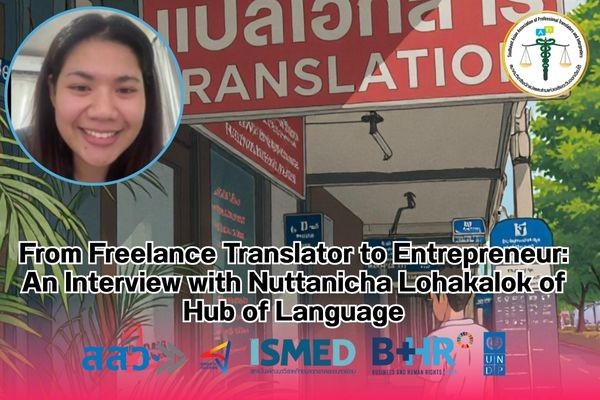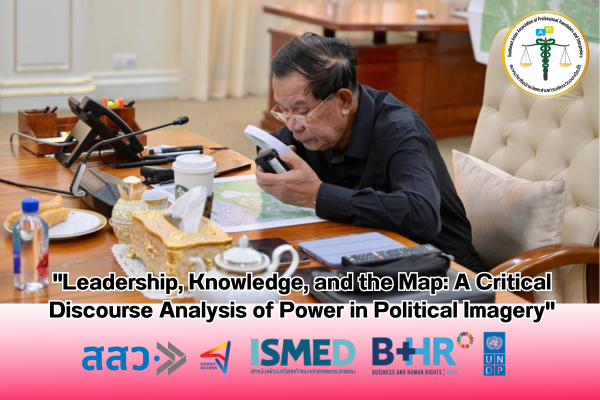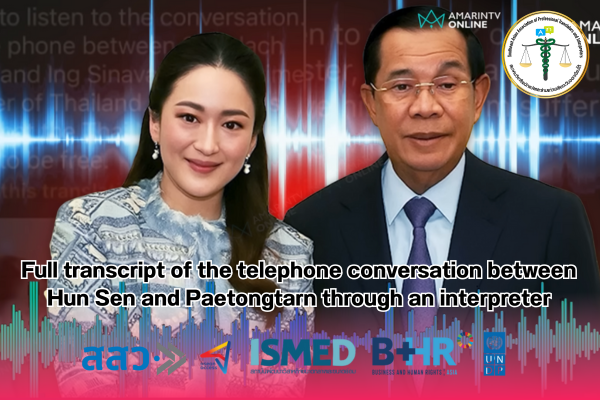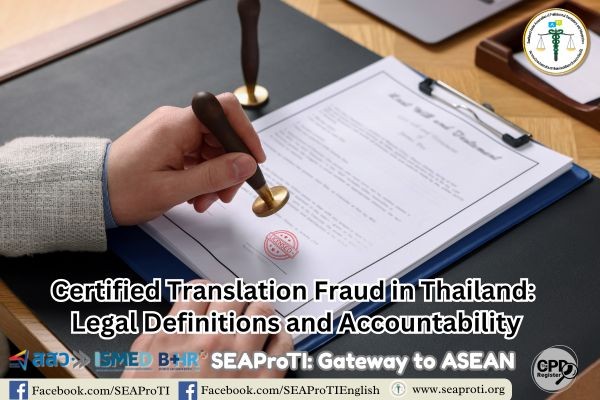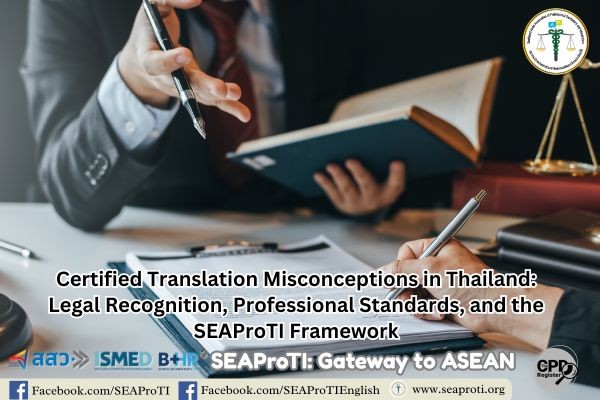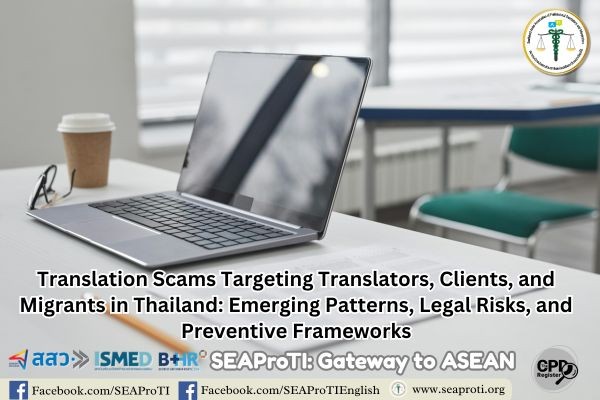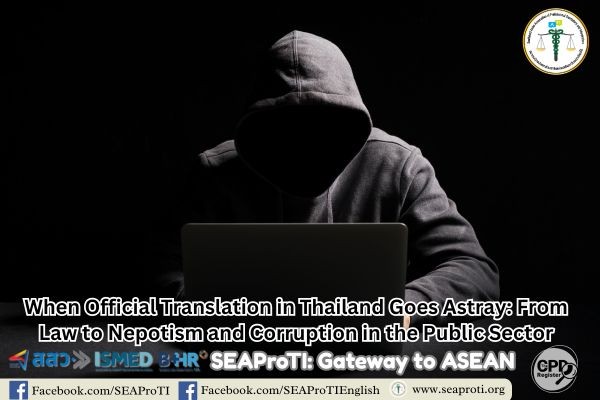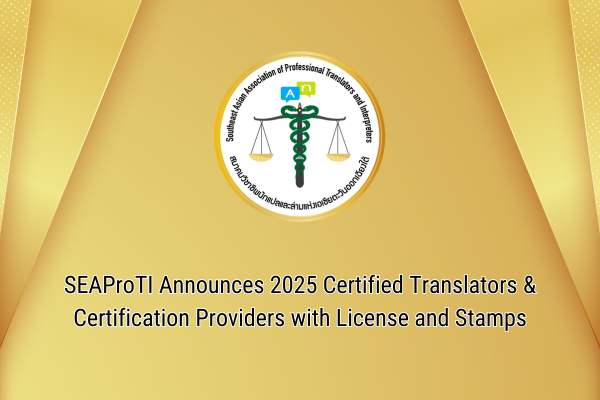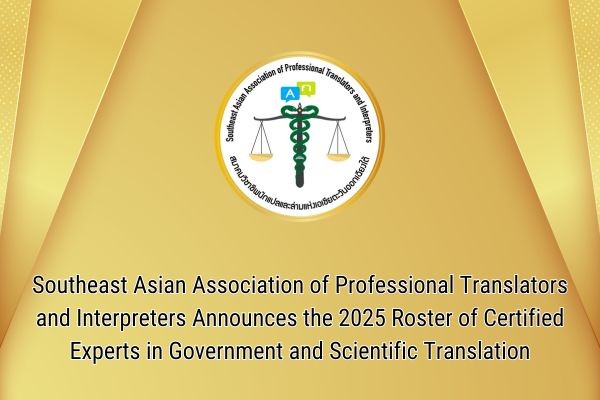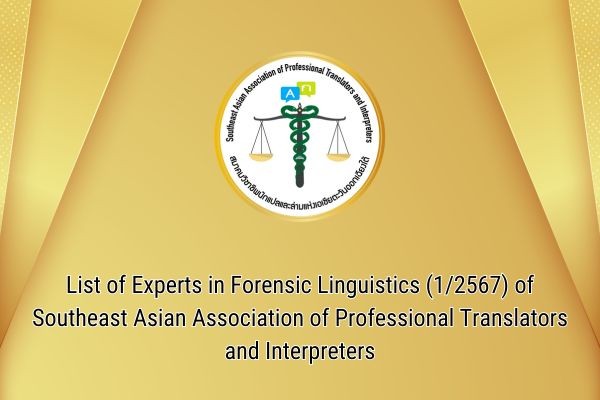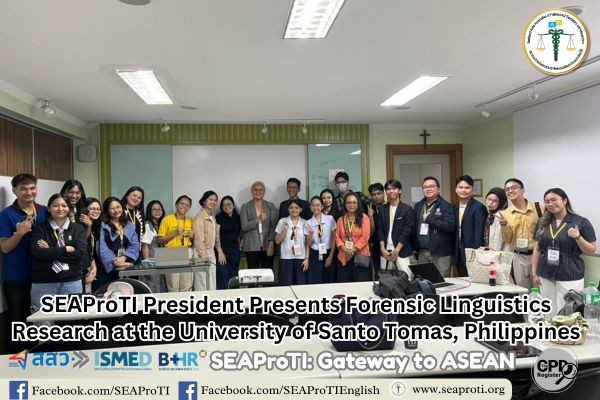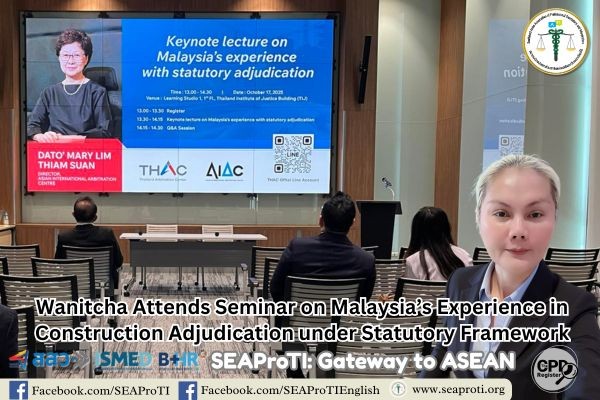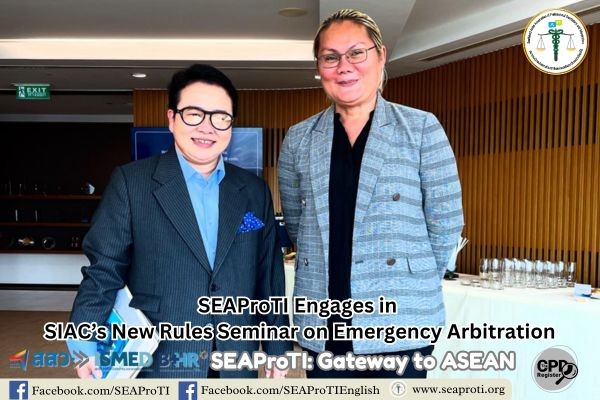From Freelance Translator to Entrepreneur: An Interview with Nuttanicha Lohakalok of Hub of Language
Written by Kittiwat Nakwong and Cholpaporn Boonmak
Edited by Wanitcha Sumanat
On 10 July 2025, Bangkok – Kittiwat Nakwong and Cholpaporn Boonmak from the Southeast Asian Association of Professional Translators and Interpreters (SEAProTI) had the opportunity to interview Ms. Nuttanicha Lohakalok, the founder and owner of “Hub of Language”. This company offers a wide range of translation services, covering everything from general translation to certified document translation for consulates, embassies, and relevant government agencies. Established in 2020, the company has continued to grow and is now well recognized within the translation industry.
The interview discussed a wide range of engaging topics, including Lohakalok’s entry into the translation profession, the growth of her private business, her attainment of professional certification from SEAProTI, and her reflections on the evolving role of translators in an era increasingly shaped by artificial intelligence (AI).
From Schoolgirl Dream to Translation Entrepreneur: Lohakalok’s Journey into the Language Industry
Lohakalok revealed that her passion for translation started as early as secondary school. “This has been my dream job since Grade 8. I wanted a career that gave me the freedom to work from anywhere,” she told the interviewer, under SEAProTI’s supervision. To hone her skills, she often translated English novels into Thai for practice. By her third year at Assumption University, she had already begun working as a freelance translator on online platforms like Fastwork.
After graduating from Assumption University, she continued accepting translation assignments while working a full-time job. Eventually, she decided to resign and pursue freelance translation full-time, which ultimately led her to establish her own business.
“Translation skills have opened the door to countless opportunities,” she reflected. “At first, I assumed translation was limited to documents or interpreting. However, once I started working, I discovered that it also extended to tasks such as visa applications, marriage certificates, and even birth registrations. I learned gradually through hands-on experience and kept building from there.”
SEAProTI Certification Boosts Business Credibility, Says Lohakalok
Lohakalok, a professional translator certified by the Southeast Asian Association of Professional Translators and Interpreters (SEAProTI), affirms that obtaining this certification has had a positive impact on her business.
“Obtaining certification from this association has helped our business in several ways,” Lohakalok explained. “First and foremost, it enhances our credibility. When we advertise, we inform clients that we hold this certification, which gives us a competitive advantage over others. Combined with the fact that we operate as a registered company, these two factors together make our work proceed more smoothly.”
AI as a Frontline Tool, Not a Final Authority: Lohakalok on Responsible Use of AI in Translation
In an era where artificial intelligence is becoming deeply integrated into many professions, including translation and interpretation, professional translator Lohakalok shared her nuanced perspective on its role in her work.
“For tasks with extensive numerical details, such as academic transcripts, we use AI to extract numbers or course codes and organize them into tables,” she explained. “This method helps us work faster and more accurately. In cases where we encounter specialized terminology, like that found in international shipping documents, if we’re unsure of a term’s true meaning, we first consult AI to get a general idea. Then, we verify the information using reliable sources like Google to ensure the meaning is accurate and relevant.”
Agreeing with the interviewer’s comment that AI has become a kind of “front line” tool, Lohakalok elaborated, “That’s right. In the past, we used search engines like Google and had to click through every website ourselves. Now, AI summarizes the content for us, and we then trace it back to the source. We don’t trust AI 100%, so we still double-check on Google to confirm it.”
Her remarks underscore an important principle in professional translation: while AI can streamline information gathering and summarization, it is not a replacement for human judgment. Especially when translating sensitive or high-stakes documents, thorough verification remains essential to ensure accuracy, relevance, and client trust.
Beyond Translation: Lohakalok Emphasizes Expertise in Document Certification and Client Guidance
When asked about the core strengths she has developed throughout her career, professional translator Lohakalok highlighted a crucial distinction: “Our strength lies in understanding ‘documents’ and the procedures of certification in depth, not just translation.”
Her company specializes in certified document services, including government authentication, overseas document use, and translations that require formal certification. A major advantage, she noted, is the team’s ability to communicate complex certification processes to clients clearly.
“We understand what the details of certification 1, 2, 3, 4 are and can explain them thoroughly; we get to the core of it,” Lohakalok told the interviewer, emphasizing the importance of practical knowledge in client-facing work.
Looking ahead, she also sees significant expansion opportunities. With growing demand for services related to visa applications and international marriages, she aims to broaden the company’s offerings in response to these evolving client needs.
Preparing for Apostille and Upholding Ethics: Lohakalok Stresses Integrity Amid Industry Shifts
Amid rapid changes in technology and policy, Lohakalok recognizes the potential impact of the Apostille system, a form of international document certification, on the translation and certification industry. She explained that the widespread adoption of Apostilles depends largely on government regulation. If implemented extensively, it could reduce the demand for traditional certified translations, making some roles obsolete.
To future-proof her business, she is proactively planning to offer notary services or certifications by authorized officials, ensuring her company remains adaptable to evolving regulatory landscapes.
Another key distinction of her company lies in its strong commitment to ethics and accuracy, principles she believes are often neglected in a market dominated by intense price competition.
“We don’t take jobs where clients ask us to ‘lie’ or alter information; for example, changing a 1 to a 4. We absolutely won’t do that,” she asserted. Lohakalok emphasized that maintaining high standards, even when facing cheaper competitors offering 50- or 100-baht translations, is what earns long-term trust and repeat clients.
“Collect the Coins”: Lohakalok Encourages Aspiring Translators to Embrace Every Opportunity
Lohakalok offered heartfelt advice to young people aspiring to enter the translation profession: don’t shy away from small or seemingly unprofitable opportunities—they may be more valuable than they appear.
“Our first translation job wasn’t worth it; we even lost money. But just do it,” she said. “It’s like collecting ‘coins,’ which in this case means opportunities, experiences, and confidence. When a big opportunity comes, you’ll already have the capital you’ve built up.”
Her words reflect not only persistence but also a pragmatic mindset: building a career in translation requires accumulating experiential capital, something that can’t be rushed or replaced.
Lohakalok’s Journey: A Translator’s Path to Business Success Through Integrity, Adaptability, and Expertise
The story of Lohakalok, founder of Hub of Language, exemplifies how a translator can go beyond language proficiency to build a thriving business grounded in bureaucratic expertise, technological adaptability, and unwavering professional ethics.
Her journey offers more than just inspiration for aspiring translators; it delivers a powerful business lesson. In an era defined by digital disruption and AI advancement, success is not about undercutting prices or racing machines. It’s about building lasting trust through quality work, in-depth knowledge, and professionalism.
SEAProTI’s certified translators, translation certification providers, and certified interpreters:
The Southeast Asian Association of Professional Translators and Interpreters (SEAProTI) has officially announced the criteria and qualifications for individuals to register as “Certified Translators,” “Translation Certification Providers,” and “Certified Interpreters” under the association’s regulations. These guidelines are detailed in Sections 9 and 10 of the Royal Thai Government Gazette, issued by the Secretariat of the Cabinet under the Office of the Prime Minister of the Kingdom of Thailand, dated July 25, 2024, Volume 141, Part 66 Ng, Page 100. the Royal Thai Government Gazette
จากฟรีแลนซ์สู่ผู้ประกอบการ: บทสัมภาษณ์ ณัฐณิชา โลหะกาลก ผู้ก่อตั้ง Hub of Language
เรียบเรียงโดย กิตติวัฒน์ นักวงศ์ และ ชลภาภรณ์ บุญมาก
ตรวจแก้โดย วณิชชา สุมานัส
10 กรกฎาคม 2568, กรุงเทพมหานคร – คุณกิตติวัฒน์ นักวงศ์ และชลภาภรณ์ บุญมาก จากสมาคมวิชาชีพนักแปลและล่ามแห่งเอเชียตะวันออกเฉียงใต้ (SEAProTI) ได้มีโอกาสสัมภาษณ์คุณณัฐณิชา โลหะกาลก ผู้ก่อตั้งและเจ้าของบริษัท “Hub of Language” ซึ่งให้บริการแปลเอกสารหลากหลายประเภท ตั้งแต่การแปลทั่วไป ไปจนถึงการแปลเอกสารรับรองสำหรับสถานทูต กงสุล และหน่วยงานราชการที่เกี่ยวข้อง บริษัทก่อตั้งขึ้นในปี 2563 และเติบโตอย่างต่อเนื่องจนเป็นที่ยอมรับในวงการแปล
การสัมภาษณ์ในครั้งนี้พูดคุยในประเด็นที่หลากหลาย ตั้งแต่เส้นทางเข้าสู่อาชีพนักแปล การเติบโตสู่ธุรกิจส่วนตัว การได้รับใบรับรองวิชาชีพจาก SEAProTI รวมถึงมุมมองต่อบทบาทของนักแปลในยุคที่ปัญญาประดิษฐ์ (AI) เข้ามามีบทบาทมากขึ้นในสายอาชีพนี้
จากความฝันในวัยเรียน สู่ผู้ประกอบการด้านภาษา
คุณณัฐณิชาเล่าว่าเธอเริ่มสนใจการแปลตั้งแต่ช่วงมัธยมต้น “นี่คืองานในฝันตั้งแต่ ม.2 อยากมีอาชีพที่สามารถทำงานจากที่ไหนก็ได้” เธอบอกกับทีมสัมภาษณ์ โดยในช่วงเรียนมหาวิทยาลัยอัสสัมชัญ เธอฝึกฝนโดยแปลนิยายภาษาอังกฤษเป็นภาษาไทย และเริ่มรับงานฟรีแลนซ์ผ่านแพลตฟอร์มออนไลน์อย่าง Fastwork ตั้งแต่ปี 3
หลังเรียนจบ เธอยังรับงานแปลควบคู่กับงานประจำ ก่อนจะตัดสินใจลาออกและหันมาทำฟรีแลนซ์เต็มตัว จนในที่สุดก็เปิดธุรกิจของตนเอง
“ทักษะการแปลเปิดประตูสู่โอกาสมากมาย” เธอกล่าว “ตอนแรกคิดว่าการแปลคือแค่เอกสารหรือการล่าม แต่พอทำจริงถึงรู้ว่าครอบคลุมไปถึงเอกสารขอวีซ่า ทะเบียนสมรส สูติบัตร ฯลฯ ทุกอย่างได้เรียนรู้จากประสบการณ์และค่อย ๆ สั่งสมมาเรื่อย ๆ”
ใบรับรองจาก SEAProTI เสริมความน่าเชื่อถือทางธุรกิจ
ในฐานะนักแปลวิชาชีพที่ได้รับการรับรองจาก SEAProTI คุณณัฐณิชาให้ความเห็นว่าใบรับรองนี้ช่วยเพิ่มความน่าเชื่อถือให้ธุรกิจได้อย่างชัดเจน
“การได้รับใบรับรองจากสมาคมนี้ช่วยให้ธุรกิจเราแข็งแกร่งขึ้นหลายด้าน” เธออธิบาย “อันดับแรกคือเรื่องความน่าเชื่อถือ เวลาประชาสัมพันธ์ เราจะบอกลูกค้าว่าเรามีใบรับรองนี้ ซึ่งกลายเป็นข้อได้เปรียบเหนือคู่แข่ง และเมื่อรวมกับการจดทะเบียนบริษัทอย่างถูกต้อง สองสิ่งนี้ทำให้การดำเนินงานราบรื่นขึ้นมาก”
ใช้ AI อย่างมีวิจารณญาณ: เครื่องมือหน้าแรก ไม่ใช่คำตัดสินสุดท้าย
ในยุคที่ AI กลายเป็นเครื่องมือสำคัญในงานแปล คุณณัฐณิชาแชร์มุมมองว่าเธอใช้ AI เป็นผู้ช่วย แต่ไม่ใช่คำตอบสุดท้าย
“เวลาแปลทรานสคริปต์หรือเอกสารที่มีตัวเลขเยอะ ๆ เราใช้ AI ช่วยดึงข้อมูลเช่นรหัสวิชา แล้วจัดเรียงในตาราง ทำให้งานเร็วและแม่นยำขึ้น” เธออธิบาย “หรือเวลามีคำศัพท์เฉพาะจากเอกสารโลจิสติกส์ เราก็ใช้ AI เพื่อดูภาพรวม แล้วค่อยตรวจสอบกับแหล่งข้อมูลที่เชื่อถือได้ เช่น Google”
เมื่อทีมสัมภาษณ์กล่าวว่า AI เปรียบเสมือน “แนวหน้า” เธอก็เห็นด้วยว่า “ใช่ค่ะ เมื่อก่อนต้องค้น Google แล้วเปิดทีละเว็บ เดี๋ยวนี้ AI สรุปให้ก่อน แล้วเราค่อยตามไปดูแหล่งที่มาทีหลัง เราไม่เชื่อ AI ร้อยเปอร์เซ็นต์ ยังต้องตรวจสอบซ้ำเสมอ”
เข้าใจ “การรับรองเอกสาร” อย่างแท้จริง
เมื่อถูกถามถึงจุดแข็งสำคัญในอาชีพ เธอย้ำว่า “จุดแข็งของเราคือความเข้าใจ ‘เอกสาร’ และขั้นตอนการรับรอง ไม่ใช่แค่การแปล”
Hub of Language มีความเชี่ยวชาญในการให้บริการเอกสารที่ต้องการการรับรอง เช่น การใช้ในต่างประเทศ การประทับตราจากรัฐ และเอกสารราชการต่าง ๆ โดยความแตกต่างคือทีมงานสามารถอธิบายขั้นตอนต่าง ๆ ให้ลูกค้าเข้าใจได้ชัดเจน
“เรารู้ว่า การรับรอง 1, 2, 3, 4 หมายถึงอะไร และอธิบายได้ตรงจุด” เธอกล่าว พร้อมเสริมว่าธุรกิจมีแนวโน้มจะขยายเพิ่มเติม เช่น การให้บริการด้านการสมรสกับชาวต่างชาติ และการขอวีซ่าซึ่งมีความต้องการสูงขึ้น
เตรียมรับมือ Apostille และยืนหยัดในจรรยาบรรณ
เมื่อพูดถึงระบบ Apostille หรือการรับรองเอกสารระหว่างประเทศซึ่งอาจส่งผลต่ออุตสาหกรรมการแปล เธอเห็นว่า การเปลี่ยนแปลงจะขึ้นอยู่กับนโยบายรัฐ หาก Apostille ถูกใช้อย่างแพร่หลาย บริการแปลแบบเดิมอาจลดบทบาทลง
เธอจึงเริ่มวางแผนขยายบริการไปสู่การรับรองโดยทนายหรือเจ้าหน้าที่ที่มีอำนาจ เพื่อให้ธุรกิจสามารถปรับตัวได้ในอนาคต
ที่สำคัญอีกประการคือจรรยาบรรณในอาชีพ “ลูกค้าบางคนอยากให้เรา ‘เปลี่ยนตัวเลข’ เช่น จาก 1 เป็น 4 เราไม่รับงานแบบนี้เด็ดขาด” เธอยืนยัน พร้อมระบุว่าแม้จะมีผู้แข่งขันที่เสนอราคาถูกกว่า เธอก็ยังเลือกยึดมั่นในมาตรฐานคุณภาพ เพราะนั่นคือสิ่งที่ทำให้ลูกค้ากลับมาใช้งานซ้ำ
“เก็บเล็กผสมน้อย”: คำแนะนำจากใจถึงคนรุ่นใหม่
คุณณัฐณิชาฝากคำแนะนำถึงคนรุ่นใหม่ที่อยากเข้าสู่วงการแปลว่า อย่ากลัวโอกาสเล็ก ๆ หรือรายได้น้อยในช่วงแรก
“งานแปลชิ้นแรกของเรายังขาดทุนเลย แต่ก็ทำไปก่อน มันเหมือน ‘เก็บเหรียญ’ ซึ่งหมายถึงการเก็บเกี่ยวประสบการณ์ โอกาส และความมั่นใจไว้ก่อน พอถึงเวลาที่โอกาสใหญ่มา เราจะมีทุนพร้อมใช้งานแล้ว”
คำพูดของเธอสะท้อนความคิดที่ทั้งอดทนและเป็นระบบ การสร้างอาชีพแปลไม่สามารถเร่งรีบได้ ต้องอาศัยเวลาและความพากเพียร
บทสรุป: ความสำเร็จของนักแปลที่ยืนหยัดด้วยความรู้ ความยืดหยุ่น และจรรยาบรรณ
เรื่องราวของณัฐณิชา โลกะลาภ ผู้ก่อตั้ง Hub of Language เป็นตัวอย่างชัดเจนว่า นักแปลไม่จำเป็นต้องหยุดอยู่แค่ทักษะภาษา แต่สามารถสร้างธุรกิจที่มั่นคงได้ด้วยความเข้าใจระบบราชการ ความสามารถในการปรับตัวกับเทคโนโลยี และการยึดมั่นในจรรยาบรรณวิชาชีพ
นี่ไม่ใช่เพียงแรงบันดาลใจสำหรับนักแปลรุ่นใหม่เท่านั้น แต่ยังเป็นบทเรียนทางธุรกิจที่สะท้อนว่า ในยุคที่ถูกท้าทายด้วยเทคโนโลยีและการแข่งขันด้านราคา ความสำเร็จไม่ได้อยู่ที่การแข่งกับ AI หรือการลดราคา แต่คือการสร้าง “ความน่าเชื่อถือ” ผ่านผลงานคุณภาพ ความรู้ลึก และความเป็นมืออาชีพ
เกี่ยวกับนักแปลรับรอง ผู้รับรองการแปล และล่ามรับรองของสมาคมวิชาชีพนักแปลและล่ามแห่งเอเชียตะวันออกเฉียงใต้
สมาคมวิชาชีพนักแปลและล่ามแห่งเอเชียตะวันออกเฉียงใต้ (SEAProTI) ได้ประกาศหลักเกณฑ์และคุณสมบัติผู้ที่ขึ้นทะเบียนเป็น “นักแปลรับรอง (Certified Translators) และผู้รับรองการแปล (Translation Certification Providers) และล่ามรับรอง (Certified Interpreters)” ของสมาคม หมวดที่ 9 และหมวดที่ 10 ในราชกิจจานุเบกษา ของสำนักเลขาธิการคณะรัฐมนตรี ในสำนักนายกรัฐมนตรี แห่งราชอาณาจักรไทย ลงวันที่ 25 ก.ค. 2567 เล่มที่ 141 ตอนที่ 66 ง หน้า 100 อ่านฉบับเต็มได้ที่: นักแปลรับรอง ผู้รับรองการแปล และล่ามรับรอง


